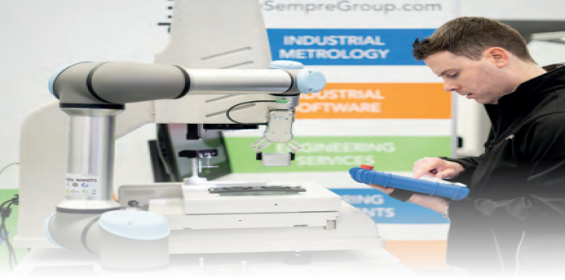Getting back on your feet with metrology
Published: 10 February, 2021
Mike John* emphasises why British manufacturing needs a cultural shift to get back on its feet.
We are seeing a slow, but promising increase in manufacturing output, as British manufacturers work hard to get back on track. Many manufacturers are looking for ways to operate more efficiently and more productively, although, with many businesses cash-poor, it is vital that businesses consider return on investment (ROI).
When investing in equipment to drive productivity, we typically think about investing in big machine tools or shiny new robots. We rarely think about measurement equipment, usually dismissing it as just a way to police part quality, but there are many ways that metrology can drive real value.
Metrology for a productive process
There are clear benefits of embracing digital Industry 4.0 technologies, such as increasing throughput, reducing bottlenecks and increasing precision. Metrology ties in closely — its Quality 4.0 equivalent offers manufacturers a path to full control over their measurement data, and a way to use it as a vehicle for improvement.
Consider this example. A machinery manufacturer is checking that parts are within Process, Controls & Plant Focus on: Sensors & Measurement specification on a co-ordinate measurement machine (CMM). The CMM, although thorough, can be expensive, slow to take measurements and often create bottlenecks in the process. Every part is manually loaded, and the data copied from the machine to an Excel spreadsheet. Manually entering the data is time consuming for staff, and prone to human error.
Accessing the data retrospectively, for example if there is a customer complaint, is a complex task that takes time and effort, as there is no software to connect individual data points. Similarly, reporting for compliance purposes is an arduous task.
Therefore, combining a range of fast advanced technology systems such as optical CMMs, optical shaft measurement systems and 2D scanning systems with an electronic quality management system (QMS), gives a much more efficient solution, collecting data automatically from individual machines, pooling the data in a way that can alert the manufacturer to how machines are performing, while giving detailed insights on part quality.
Manufacturers can even automate the quality processes, such as by adding a collaborative robot to load and unload the component ontothe fixture, so that processes can run accurately and without the need for breaks. This can also improve productivity by increasing throughput, as well as the added benefits in accuracy.
The granular level of data enables root cause analysis, where manufacturers can diagnose a problem and make improvements to their line, driving up yield and increasing the number of saleable products that come off the line.
The level of traceability afforded by a Quality 4.0 approach also brings reporting and compliance benefits, which is particularly appealing in industries like medical and aerospace where expectations are high. This brings confidence in the product and process, something it is difficult to put a price on.
Investing to suit your budget
Now is a difficult time to take a leap of faith, but without embracing digital technology, our productivity woes are here to stay. When investing in equipment, consider first whether there is an option to rent or lease purchase it, so you can try before you buy, as well as build a strong business case for the investment.
Also, consider your suppliers, can they provide a bespoke solution to your specific requirements? Are they tied into supplying one main product type, that may leave them blind to what the best solution for you is? How will you maintain and service the equipment so it can continue to drive value long term?
The future of British productivity
If we stop seeing technology as a way to keep up and start seeing it as a way to take the lead, we can empower our workforces, manufacture better products and drive productivity and value. We need to encourage collaboration between production engineers and quality managers, identify areas of improvement and use data as our guiding light. Just think, if we could get businesses operating at a productivity level far beyond their pre-Covid levels, wouldn’t that make for a great industry report?
*Mike John is managing director at industrial metrology provider The Sempre Group
For more information:
https://www.thesempregroup.com/
https://twitter.com/thesempregroup
https://www.linkedin.com/company/thesempregroup/







